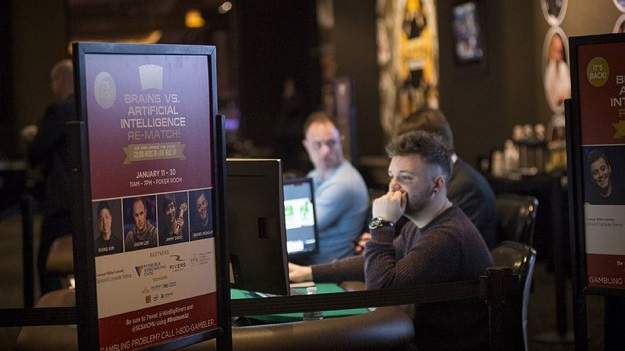How AI beat four of the world's best poker players
The programme wasn’t even working on its full capacity

The programme wasn’t even working on its full capacity. PHOTO: REUTERS
Libratus, an artificial intelligence programme developed at Carnegie Mellon University, was trained to play a variant of the game known as no-limit heads-up Texas hold 'em. The tournament that lasted for 20 days was played by four of the world's best Texas Hold’Em poker players.
“At a high level, this means now that we have proven the ability for an AI to do strategic reasoning in imperfect situations has surpassed that of humans,” said Carnegie Mellon University Professor of Computer Science Tuomas Sandholm during a press conference following the AI victory at Rivers Casino “Brains vs Artificial Intelligence: Upping the Ante” tournament in Pittsburgh, Pennsylvania.
Virtual butler 'Jarvis' takes up residence in Facebook founder's home
 PHOTO: CMU
PHOTO: CMUThe game lasted over 200 hours and was watched by thousands of people across 151 countries on the Twitch network. Libratus beat four poker pros namely Dong Kim, Jimmy Chou, Daniel McAulay and Jason Les.
The victory comes nearly two years after a similar AI programme, Claudico, lost almost three-quarters of a million dollars in chips in a poker competition. Libratus, however, won decisively by more than $1.7 million chips.
Though no actual payouts were made, the accomplishment is a turning point in Artificial Intelligence history.
Carnegie Mellon's Libratus #AI defeats top human poker pros in historic #BrainsVsAI https://t.co/HnMV7uPL1w @WinBigRivers @psc_live pic.twitter.com/PBrFcDFQjG
— CMU School of Computer Science (@SCSatCMU) January 31, 2017
Though AI programmes have triumphed over humans in games such as chess in the past, their ability to beat humans in poker is quite different.
Games such as chess are what programmers call perfect information games where the AI programme has to search through a number of possible outcomes in a game tree and choose the best move. Poker on the other hand is an incomplete information game where the cards the opponent has are not known and requires the AI programme to approach the hand as a human would.
This is also more complicated because the game depends not only on the hidden and still-to-be-drawn cards, but also on how the poker opponent has played and therefore the game tree approach no longer applies.
Unlike other AI models, Libratus didn't learn the game by observing human players but by playing trillions of poker hands against itself before facing an opponent. “We gave it the rules of the game and we had the bot play against itself, starting from scratch.”
 PHOTO: CMU
PHOTO: CMUThe programme learned to come up with a strategy for finding hidden information. “Libratus is always going to do what it thinks is going to make the most money possible,” he said.
Thus, some of its actions could look like bluffing. “You could see the bot making really innovative moves like betting huge amounts of money on small pots,” he said. “Humans are afraid to do these kinds of actions; the bot is fearless.”
“Halfway through the challenge, we really thought we were going to win and we were beaten very soundly,” said McAulay, echoing other players who called the almost daily losses 'demoralising'.
Chinese AI robot takes on humans in reality TV show
What’s more surprising is that the programme wasn’t even working on its full capacity and dedicated only 46 per cent of Bridges’s computational capacity using the rest of the super computer to find new cures for cancer and investigating next-gen nuclear power.
Libratus has specifically been designed to take imperfect situations and come up with the best strategy and as such is not necessarily a poker AI. “The algorithms are actually game-independent,” said Professor Sandholm, adding that the programme has implications for everything from negotiation and bargaining to military uses and some forms of finance.
This article originally appeared on Mashable.



















COMMENTS
Comments are moderated and generally will be posted if they are on-topic and not abusive.
For more information, please see our Comments FAQ